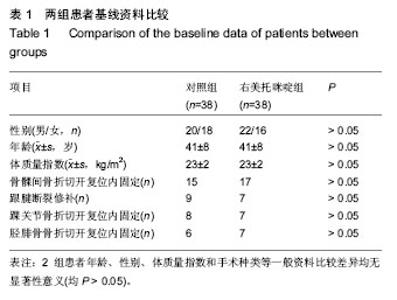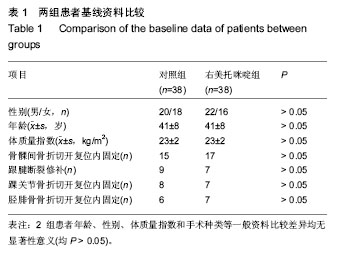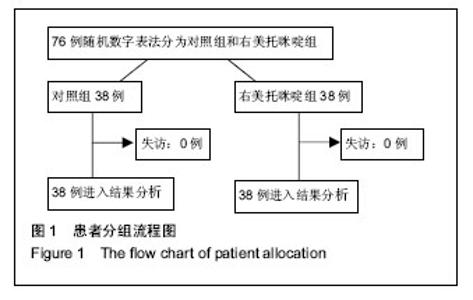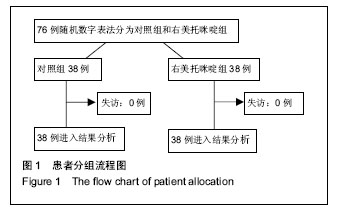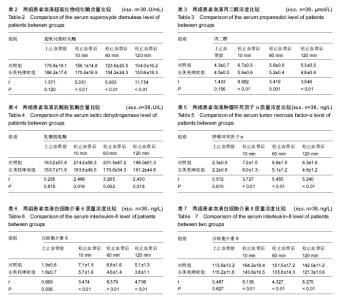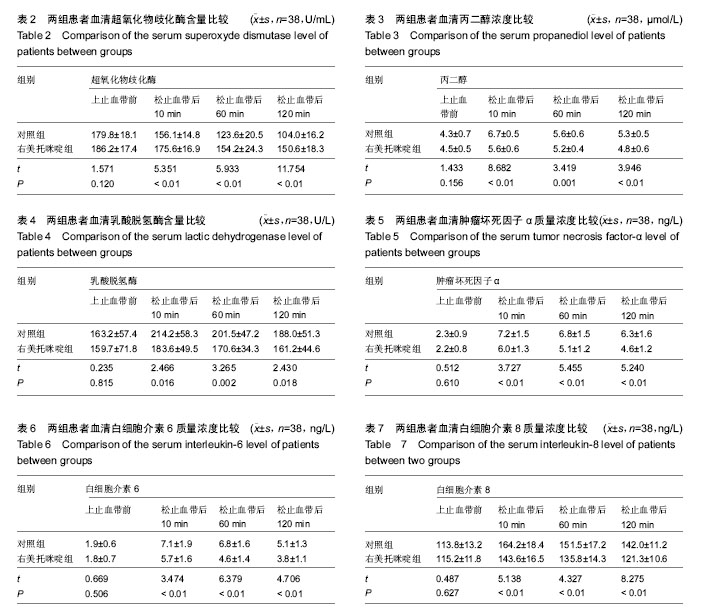| [1] Muyskens JB, Hocker AD, Turnbull DW, et al. Transcriptional profiling and muscle cross-section analysis reveal signs of ischemia reperfusion injury following total knee arthroplasty with tourniquet. Physiol Rep.2016;4(1): e12671.[2] Halladin NL, Ekeløf S, Alamili M, et al. Lower limb ischaemia and reperfusion injury in healthy volunteers measured by oxidative and inflammatory biomarkers. Perfusion.2015;30(1): 64-70.[3] 王宇,崔宇,刘斌.七氟醚和异丙酚对骨科手术患者止血带诱发肢体缺血再灌注损伤影响的比较[J].中华麻醉学杂志,2012,32(10): 1189-1191.[4] 宋海明,马靖华,陈晖.右美托咪定可减轻髋关节置换老年患者的炎症反应[J].中国组织工程研究,2015,19(44):7077-7081.[5] 全立新. 右美托咪啶减轻老年患者行全膝表面置换术止血带反应[J]. 实用医学杂志, 2015, 31(1):163-164.[6] Zeng X, Wang H, Xing X, et al. Dexmedetomidine Protects against Transient Global Cerebral Ischemia/Reperfusion Induced Oxidative Stress and Inflammation in Diabetic Rats. PloS one.2016;11(3): e0151620.[7] Karahan MA, Yalcin S, Aydogan H, et al. Curcumin and dexmedetomidine prevents oxidative stress and renal injury in hind limb ischemia/reperfusion injury in a rat model. Ren Fail. 2016;38(5):693-8.[8] 于健,李睿,姚文瑜.右美托咪啶预处理对下肢缺血再灌注致肺损伤的保护作用[J].中华医学杂志, 2014, 94(44): 3510-3514.[9] 陈月,张加强,孟凡民. 右美托咪定对肢体缺血再灌注诱发肺损伤的影响[J].中国医院药学杂志, 2015, 35(12): 1113-1115.[10] 周俊,王汉兵,林文静,等.右美托咪啶对上肢手术患者罗哌卡因臂丛神经阻滞效果及上肢缺血再灌注损伤的影响[J].中华麻醉学杂志, 2011,31(1): 84-87.[11] 温建忠,李红伟,杨建新,等.盐酸右美托咪啶对止血带引起下肢缺血再灌注损伤的影响[J].中国药物与临床, 2014, 14(10): 1400-1401.[12] 于健,李睿,王琦.右美托咪啶预处理对下肢缺血再灌注性肺损伤及一氧化氮/内皮素-1失衡的影响[J].天津医药, 2015, 43(5): 537-541.[13] Bostankolu E, Ayoglu H, Yurtlu S, et al. Dexmedetomidine did not reduce the effects of tourniquet-induced ischemia-reperfusion injury during general anesthesia. Kaohsiung J Med Sci.2013;29(2):75-81.[14] 鲍航行,王金法,蔡运火,等.全膝关节置换术后止血带性缺血再灌注损伤的临床研究[J].中华创伤骨科杂志,2011,13(3): 242-246.[15] Nishikata R, Kato N, Hiraiwa K.Oxidative stress may be involved in distant organ failure in tourniquet shock model mice. Leg Med (Tokyo).2014;16(2):70-75.[16] Akbas A, Silan C, Gulpinar MT, et al. Renoprotective Effect of Humic Acid on Renal Ischemia-Reperfusion Injury: An Experimental Study in Rats. Inflammation. 2015;38(6): 2042-2048.[17] Hori K,Tsujii M,Iino T,et al.Protective effect of edaravone for tourniquet-induced ischemia-reperfusion injury on skeletal muscle in murine hindlimb. BMC Musculoskelet Disord.2013;14: 113.[18] Saritas TB, Buyukbas S,Peker K,et al.The Effect of Oral Melatonin Premedication on Pneumatic Tourniquet Induced Ischemia Reperfusion Injury in Lower Extremity Operations. J Pain Relief.2015;4(6): 1000208.[19] Dong X,Xing Q,Li Y,et al.Dexmedetomidine protects against ischemia–reperfusion injury in rat skeletal muscle. J Surg Res.2014;186(1): 240-245.[20] Shen J, Fu G, Jiang L, et al. Effect of dexmedetomidine pretreatment on lung injury following intestinal ischemia reperfusion. Exp Ther Med.2013;6(6):1359-1364.[21] Bell MT, Puskas F, Bennett DT, et al. Dexmedetomidine, an α-2a adrenergic agonist, promotes ischemic tolerance in a murine model of spinal cord ischemia-reperfusion. J Thorac Cardiovasc Surg.2014;147(1): 500-506.[22] Yagmurdur H,Ozcan N,Dokumaci F,et al.Dexmedetomidine reduces the ischemia-reperfusion injury markers during upper extremity surgery with tourniquet. J Hand Surg Am.2008; 33(6): 941-947.[23] Santavirta S, Höckerstedt K, Niinikoski J. Effect of pneumatic tourniquet on muscle oxygen tension. Acta Orthop Scand. 1978;49(5):451-459.[24] Germann G, Drücke D, Steinau HU. Adhesion receptors and cytokine profiles in controlled tourniquet ischaemia in the upper extremity. J Hand Surg Br.1997;22(6):778-782.[25] Cheng YJ, Chien CT, Chen CF. Oxidative stress in bilateral total knee replacement, under ischaemic tourniquet. J Bone Joint Surg Br.2003;85(5):679-682.[26] Cakir M, Polat A, Tekin S, et al.The effect of dexmedetomidine against oxidative and tubular damage induced by renal ischemia reperfusion in rats. Ren Fail.2015;37(4): 704-708.[27] Cekic B, Geze S, Ozkan G, et al. The effect of dexmedetomidine on oxidative stress during pneumoperitoneum. BioMed Res Int.2014;2014: 760323.[28] 蒋鹏,黄祥君,马鹏,等.右美托咪啶对止血带引起下肢缺血-再灌注损伤的保护作用[J].江苏医药, 2015, 41(22): 2716-2717.[29] Esposito K, Nappo F, Marfella R, et al. Inflammatory cytokine concentrations are acutely increased by hyperglycemia in humans role of oxidative stress. Circulation.2002;106(16): 2067-2072. |
